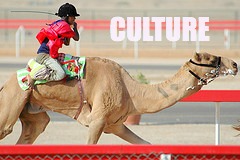
Certain areas the UAE such as Dubai have been known to harness a class based system which holds the migrant workers in the lower classes.
There have rarely been ethnic tensions but when there have it has been minor and usually associated with the expatriate community.
Festivals
There are a number of national holidays which take place every year, the main ones are Eid ul-Fitr whch is a festival that marks the end of Ramadan, and National Day which is to celebrate the formation of the seven emirates. Other festivals include Waqfa, Eid al-Adha, the Islamic New Year, Mawlid and Lailat al Miraj,
Religion
Naturally a diverse and multicultural society brings with it diversity within religions, and the UAE is no exception to this. The main religion is still Islam and is widely practiced throughout the UAE. Around 76% of the population is Islam with more Sunni than Shiite Muslims amongst this percentage. Polygamy is legal within this religion, permitting a man to have up to four wives.
Other religions such as Hinduism and other Indian religions make up around 15% of the UAE’s religions. The Indian community contributed a lot towards Dubai’s business sector within the trade port, as an appreciation for this contribution Sheikh Rashid bin Saeed Al Maktoum built a temple complex in Bur Dubai; this is a place of worship and allows for wedding ceremonies between Hindus. This is the only government approved Hindu temple you can find in the entire Arab world.
Christianity makes up 9% of religions in the UAE and is made up of Protestants and Roman Catholics. You can find at least 33 churches throughout the UAE and the main bulk of the Christians are of an Asian origin.
The Islamic and Arab influences can be seen not only in the people but also the architecture, the music, dress, food, and lifestyle. For example 5 times a day all Muslims are called to prayer, men and women wear the traditional garments and weekends begin on Fridays, due to this being the holiest day for Muslims.
Cosmopolitanism
The UAE is renowned for its cosmopolitan feel and acceptance of other cultures. It boasts a very unique socioeconomic culture which tends to be a lot more liberal than its neighbors within the Persian Gulf. Most noticeable of this tolerance is when we look at religion; Churches, Hindu temples, and Sikh Gurdwaras can be found alongside Mosques. However, there are no Jewish synagogues in the United Arab Emirates.
The growth of cosmopolitanism has made way for things such as themed restaurants, foreign-influenced schools and cultural centers.
Read up on Cultural Taboos in the UAE, written by RTT Staff Writer Joshua Gorenflo
[custom_button text=”Teachers Apply Here” title=”Teach English in the UAE” url=”http://jobs.reachtoteachrecruiting.com/apply/CZbsFR/Certified-Primary-School-Teachers-Needed-For-Abu-Dhabi-International-Schools.html” size=”x-large” bg_color=”#073e72″ text_color=”#FFFFFF” align=”middle” target=”_self”]
[custom_button text=”Apply for a Vice Principal Position” title=”Teach English in the UAE” url=”http://jobs.reachtoteachrecruiting.com/apply/CLKEmQ/Vice-Principal-Needed-For-Abu-Dhabi-International-School.html” size=”x-large” bg_color=”#073e72″ text_color=”#FFFFFF” align=”middle” target=”_self”]

